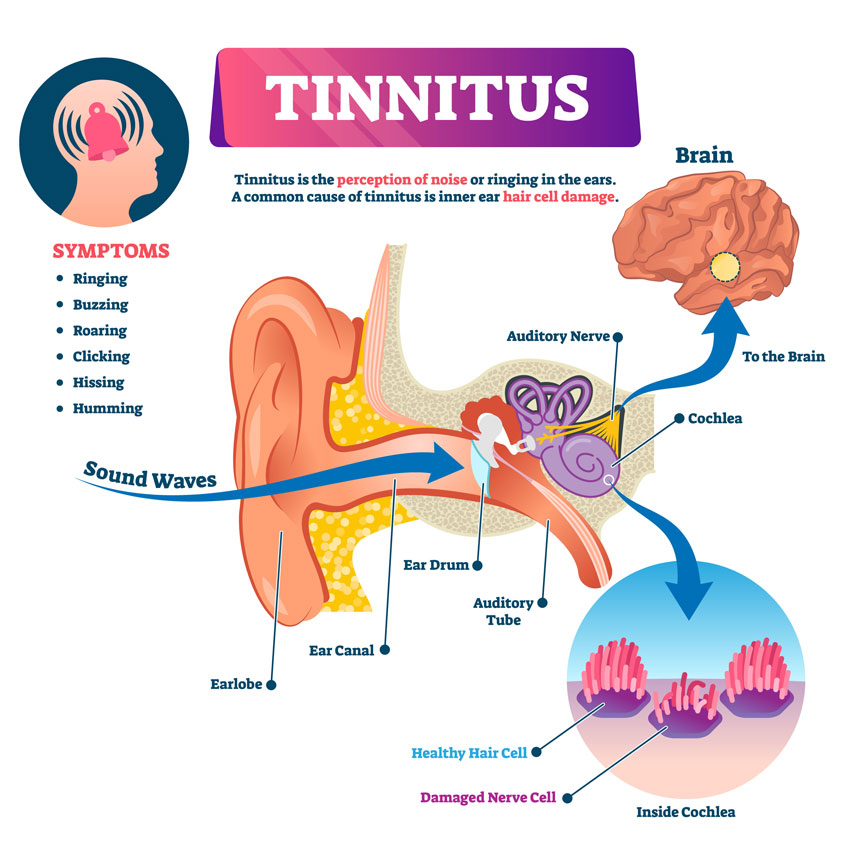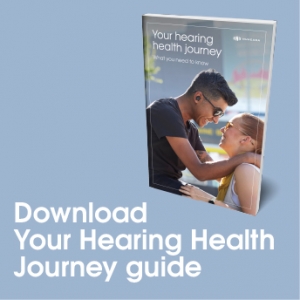
Tinnitus describes a ringing sensation in the ears that only the person suffering from the condition hears. Intrusive sounds such as buzzing, hissing, clicking or roaring also occur in some cases.
Some people experience tinnitus for only a short time such as after attending a rock concert. For others, the symptoms of tinnitus are long-term or permanent. The good news for anyone suffering from the condition is that hearable devices or traditional hearing aids may help bring tinnitus relief.
What Causes Tinnitus?
Pre-existing hearing loss is the most common cause of tinnitus. However, audiologists don’t fully understand what causes the condition in most cases. Here are some other possible reasons for the development of tinnitus:
- Anemia
- Buildup of earwax
- Excessive caffeine intake
- Exposure to loud noise
- Head injury
- History of high blood pressure
- History of migraine headaches
- Ménière’s disease
- Nicotine
- Side effect of prescription medication or illicit drugs
- Some types of tumors
- Unrelenting stress

How Hearing Aids Bring Relief from Tinnitus
Audiologists often prescribe hearing aids for patients with hearing loss who also experience tinnitus symptoms. Sometimes hearing aids alone are enough to significantly reduce symptoms. Alternatively, an audiologist may recommend wearing them as part of a larger treatment protocol.
Tinnitus sufferers tend to experience the most relief when they wear hearing aids in both ears rather than just one ear. Since digital hearing aids became available more than a decade ago, audiologists have improved ability to tailor a set of hearing aids to specific tinnitus symptoms that patients report.
Hearing Devices Benefit Tinnitus Sufferers with Normal Hearing
It’s a common misconception that people who deal with the intrusive sounds of tinnitus but otherwise have normal hearing cannot use hearing aids. The reality is that audiologists can program hearings aids for tinnitus sufferers without hearing loss to mask the ringing or other annoying sounds.
Although we started our journey at Nuheara focused on helping people with hearing loss we found that in some instances IQbuds has helped people with Tinnitus to find relief from their symptoms.https://t.co/R8UTnC2e6L #TinnitusWeek pic.twitter.com/OOGywZDGcZ
— Nuheara (@nuheara) February 9, 2020
Hearing aids work to reduce tinnitus symptoms by amplifying sounds in the environment, thereby reducing the power of internal sounds. Some hearing aids also pair with sound therapy apps, playing soothing audio such as ocean waves to mask the ringing of tinnitus.
Other treatment options for tinnitus sufferers in addition to hearing aids and devices include:
- Biofeedback
- Counseling or group therapy to help deal with the stress of persistent tinnitus.
- Relaxation or retraining therapy
- Sound machines that play relaxing music or white noise.
Hearables and the Treatment of Tinnitus
Hearables are a set of wireless devices that fit directly into the ear canal like in-the-ear hearing aids. IQbuds² MAX, pair with the IQbuds smartphone application to give users a high level of control over the sounds in both their external and internal environments.
Theses hearables help to improve the quality of life for people with a wide range of audiologic and brain conditions. Mild hearing loss, sensory processing disorder, and tinnitus are just three examples.
IQbuds² MAX, Tinnitus and Sound Therapy
Sound therapy is a proven treatment to help reduce or eliminate the internal sounds so bothersome to people dealing with tinnitus. The goal of sound therapy is to desensitize people to the ringing, buzzing, and other common sounds of tinnitus while allowing them to take in more pleasant sounds instead.
The more a tinnitus sufferer engages in sound therapy, the easier it is for the brain to retrain itself. Over time, the mind should ignore unwanted sounds and pay attention to more meaningful sounds such as other people’s voices.

IQbuds² MAX allow users to select soft, soothing music that the earbuds transmit to the ears at a comfortable volume. With lightweight earbuds and a portable smartphone application, people with tinnitus can listen to the brain retraining music according to their own schedule. For best results, IQbuds² users should try to listen to smooth or instrumental music at least a few hours a day.
Additionally, some Nuheara customers have reported that simply having the ability to control the volume of various sounds and noise around them helps alleviate tinnitus symptoms. If you or someone you know suffers from tinnitus, consider hearing aids or hearable devices such as IQbuds² MAX for symptom relief. Your ears will thank you!


